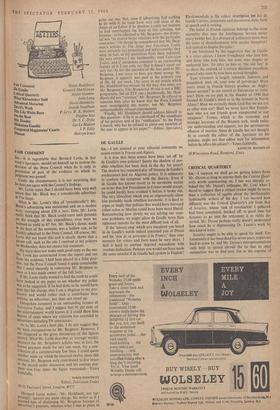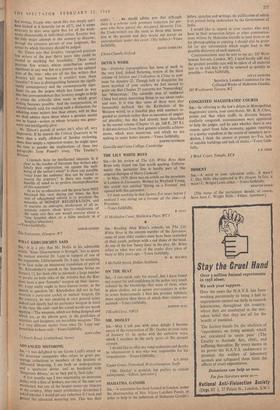CRITICAL QUARTERLY
SIR,—I suppose we shall go on getting letters from Mr. Dyson as long as anyone finds the Critical Quar- terly worth commenting on. I too was sharply re- buked (by Mr. Dyson's colleague, Mr. Cox) when I dared to suggest that a critical review might be more than a collection of squibs about the intellectually fashionable writers of the day. I too learned how different was the Critical Quarterly's job from that of Scrutiny, whose 'task of revaluation' I gathered had been completed, finished off, in good time for Scrutiny to go into the retirement it so richly de- served. Mr. Dyson perhaps really doesn't understand how much he is depreciating Dr. Leavis's work by this kind of letter.
Scrutiny ought to be able to speak for itself. Un- fortunately it has been dead for seven years, copies are hard to come by, and Mr. Dyson's misrepresentations only help to spread abroad the lie that its chief occupation was to find easy fun at the expense of had writing. People who speak like this simply can't have looked at it honestly (or at all?); and it seems necessary to state once again that for all the weak- nesses discoverable in individual critics, Scrutiny was the only major attempt in this century to discover, through the common pursuit of true judgment, the values by which literature should be judged.
Mr. Dyson says that Scrutiny 'recognised precious few writers of the past thirty years who could be treated to anything but irascibility.' There were precious few writers whose contribution seemed significant in any way but as a pointer to the cultural state of the time : who are all the fine writers that Scrutiny left out because it couldn't treat them irascibly? It was in distinguishing between the signifi- cantly contemporary and the contemporarily signi- ficant (to use the jargon. which has found its way into this correspondence) that Scrutiny sought to help to create the critically alive scene in which great writing becomes possible. And the compensation, as Arnold nearly said, for making such a distinction, for admiring some writers less than others, will be that We shall admire more those where a genuine accent can be found—writers to whom Scrutiny was gener- ously and intelligently alive
Mr. Dyson's parade of names isn't, after all, very impressive. If he intends the Critical Quarterly to be more than a stuffy offshoot of Sunday reviewing, more than simply a reputation-maker, he might spare the time to ponder the implications of these two Paragraphs from Pound's essay, 'The Teacher's M ission.'
Criminals have no intellectual interests. Is it clear to the teacher of literature that writers who falsify their registration, sin against the well- being of the nation's mind? Is there any possible 'voice from the audience' that can be raised to sustain the contrary? Is there any reader so humble of mind as to profess incomprehension of this statement?
In so far as education and the press have NOT blazoned this view during our times, the first step of educational reform is to proclaim the necessity of HONEST REGISTRATION, and to exercise an antiseptic intolerance of all in- accurate reports about letters—intolerance of the same sort that one would exercise about a false hospital chart or a false analysis in a hospital laboratory.
--Yours faithfully.
ANDoR GOMME







































 Previous page
Previous page